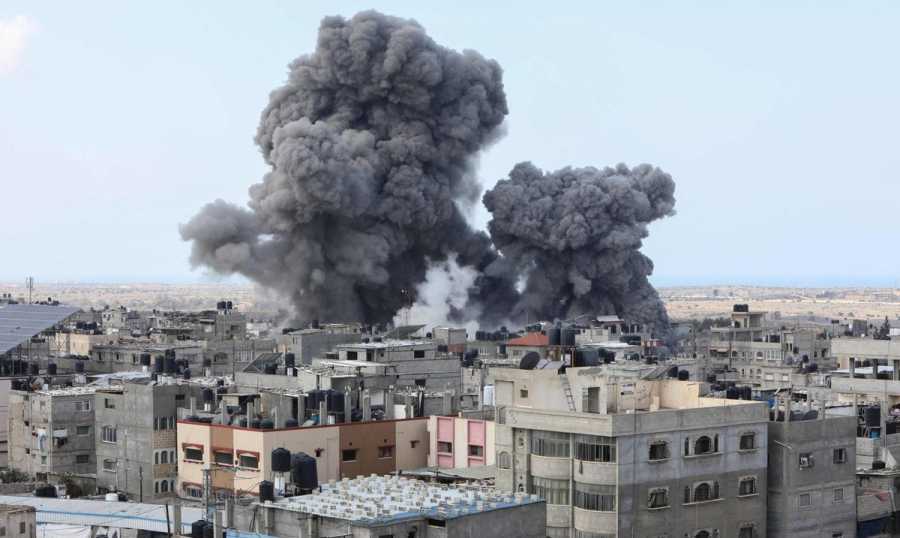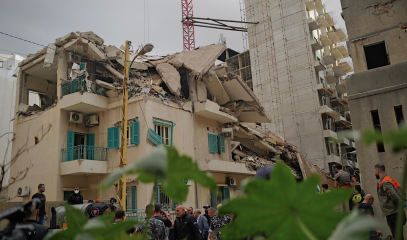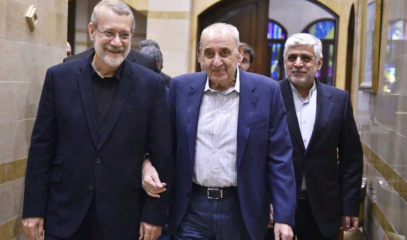Beirut: Israeli bombs hit fragile negotiations to stop the war
Negotiations for a 60-day suspension of the fighting, followed by the implementation of resolution 1701, continue on difficult tracks. Among the obstacles is the military doggedness of the Jewish state against the cedar country. Another of Hezbollah's historic leaders, Mohammed Afif, was the victim of a targeted attack. According to World Bank estimates, more than 100,000 homes have been destroyed in the last two months.
Beirut (AsiaNews) - Departing from a rule it has been observing since the raid against Hezbollah's head of liaison and coordination, Wafic Safa on October 9, and forbidding the bombing of targets in the administrative heart of Beirut, yesterday Israel struck again at the heart of the Lebanese capital. In a targeted attack, the Jewish State's missiles killed two Hezbollah cadres: Mohammed Afif, the head of the media within the pro-Iranian Shiite movement, a comrade of the first hour of Hassan Nasrallah, the secretary general of Hezbollah assassinated on 27 September last; Mohammed Madi, the head of operations in south Lebanon, was also hit.
In the past few hours, Israel confirmed that it had killed Hezbollah's ‘propaganda chief’, an apparently affable man who had made several public appearances in recent times, aware that he was running the risk of being eliminated. On the same day, the Jewish State military opened fire on a Lebanese army post in Meri, a Druze village in the Hasbaya region, killing two soldiers.
An attack launched despite the fact that, according to previously agreed rules, the army is considered militarily neutral, as is the Interim Peacekeeping Force in Southern Lebanon (Unifil). According to observers, these serious developments are part of a new phase in the war that began on 23 September between Israel and Hezbollah, which should precede a ceasefire agreement, the terms of which are currently under discussion.
This escalation was marked by a relentless attack on buildings in Haret Hreik, Bourj Brajneh and Chyah, in the southern suburbs of Beirut. The Lebanese have watched in astonishment, sometimes live, sometimes on television, the daily destruction of their real estate. The raids have not even spared places of worship: the windows of a church on the outskirts of Hadeth were also shattered by shelling.
According to unofficial World Bank estimates, more than 100,000 homes have been destroyed in the last two months, including entire villages in the south such as Kfar Kila and Adeissé, in the immediate vicinity of the border. The international institution has estimated the initial cost of the losses incurred at USD 8.5 billion, and thus the amount of the eventual reconstruction work.
However, unlike the targeted operations mentioned above, the bombardments in the southern suburbs are announced about an hour in advance to allow the civilian population to take cover. This has generally prevented loss of life. Deserted by their occupants since the first bombardment, the houses are only inspected during the day. In this regard, street surveillance has been set up to prevent looting of rubble and thefts in abandoned flats.
The Southern Front
On the southern front, the Israeli army finally managed to breach the land in the direction of the Lebanese coast, bypassing the headquarters of the Unifil forces in Naqoura, which it wanted to relocate. The artillery batteries were thus able to cross the border to support the soldiers' operations inside Lebanese territory, which were also marked by unexpected resistance from Hezbollah units.
In addition to the ground resistance, the Shia movement fires an average of 100 medium-range missiles and drones, usually against the regions of Haifa, Acca and Ashdod. However, the militiamen rarely use their long-range missiles. According to specialists, these are controlled by Iranian personnel and are subject to strict rules of use. The Israeli media claimed that ‘there was no indication that the target had been hit’, in a strategy of systematically obscuring the losses suffered by the Jewish state.
Nevertheless, it should be noted that even in this faee, the war between Hezbollah and Israel has some limitations in terms of targets: infrastructure in Lebanon, in particular Beirut International Airport, was not targeted; on the other hand, strategic targets such as the Dimona reactor, Israel's David Ben Gurion airport in Tel Aviv, and the oil fields in the Mediterranean were kept out of the bombing.
Tight negotiations
The Israeli military escalation comes at the same time as very close negotiations between Israel and Lebanon, via the United States and outgoing President Joe Biden's deputy, Amos Hochstein, towards a ceasefire. Hochstein is expected in Lebanon tomorrow and will then travel to Israel. In reality, this ceasefire would initially be a 60-day freeze of fighting that precedes Hezbollah's withdrawal north of the Litani river line and the deployment of the Lebanese army in the evacuated areas at the same time as Unifil.
‘Negotiations are taking place under fire,’ points out Kassem Kassir, an analyst close to Hezbollah. He believes that the intensification of the fighting is due to the fact that Lebanon has rejected the conditions that Israel and the United States have tried to impose. Among the conditions that the cedar country has refused to accept, Kassir explains, are ‘the formation of an international committee to oversee the implementation of UN Resolution 1701 and the authorisation for the Israeli army to carry out incursions inside Lebanon’. The next few days will be decisive for the outcome of the negotiations. The visit to Beirut of Ari Larijani, chief advisor to the Supreme Guide of the Islamic Revolution in Iran, Ali Khamenei, suggests that it will not be easy to reach an agreement.
07/02/2019 17:28
11/08/2017 20:05









.png)










